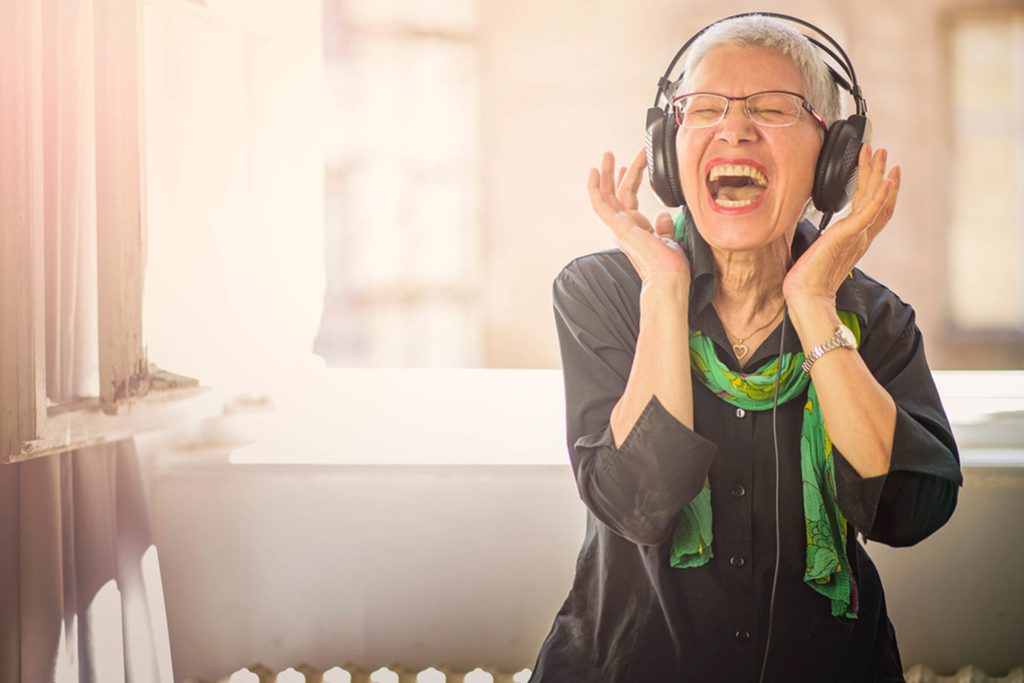Here’s How You Can Look and Feel Younger Right This Very Minute
Updated: Jul. 19, 2017
Hint: It has to do with your favorite tunes!
This past spring, at 99 years of age, Ben Skardon, a World War II veteran, made his tenth annual pilgrimage to the New Mexico desert to walk more than eight of the 26.2 mile Bataan Memorial Death March, an annual marathon commemorating the deadly march that killed thousands of Americans and Filipino soldiers on April 9, 1942. Under the searing desert sun, with temperatures reaching 90 degrees, there was concern that Skardon wouldn’t make it. But he did, and, if you’re aware of the work of Harvard Psychology Professor, Ellen J. Langer, PhD, it might not surprise you to learn that Skardon, who survived the actual Bataan Death March, once told CBS’s 60 Minutes that when he walks in the Memorial March, he is actively reliving that indelible experience from his youth.
Reliving our youth makes us feel young

For the past 38 years, Dr. Langer has been exploring the question of whether by turning back the clock psychologically, we can also turn it back physically. With her seminal “counterclockwise” experiment, she demonstrated that reliving a point in time from our younger, more vital days can immediately and significantly improve our physical well-being. For that experiment, back in 1979, Dr. Langer invited a group of men in their late 70s and 80s to literally relive a week in 1959 by living together in a building refurbished to look as if it were the year 1959, discussing current events of 1959 as if they were happening in the present, watching popular television shows from 1959 on a black-and-white television, and listening to the music that was popular in 1959. After that one week, the men demonstrated significantly improved memory, vision, hearing, and physical strength. In effect, reliving a week from the past turned back the clock physically for these men (here are some habits of people who seem younger than their age).
Dr. Langer’s experiment involved immersing people in their younger days through a variety of cultural clues. However, evidence has been mounting that it may not be necessary to go to such elaborate lengths to reap the same anti-aging rewards. Clearly, Ben Skardon has been able to channel the youthful vitality he possessed when he was a young man trudging 66 miles through the Bataan Peninsula merely by meditating on the experience while walking in a New Mexican desert. But even that may be overkill. Turns out that listening to music from your past can help transport you back to the point in time when you first heard it.
The anti-aging power of music

In the nearly 40 years that have passed since Dr. Langer’s original experiment, it’s become accepted scientific knowledge that music stimulates the emotional center of the brain. That, in turn helps to improve both recall and retention, according to Sally Morgan, PT, CST, a physical therapist who has observed the effects in her practice, which, just by coincidence, happens to involve working with WWII veterans. Whenever Morgan would play music from the late 1940s and early 1950s—the time of their return from the war, the vets would suddenly became energized and talkative, rehashing obscure stories from that time. It was as if the vets were literally transported back in time by the music, Morgan told Reader’s Digest.
That music connects with the area in the brain associated with identity is another plausible theory. “When you hear music of your youth, you will remember where you were when you first heard it,” says Lynn Jordan, a yoga teacher who incorporates music and dance therapy modalities into her classes for the elderly. “When that happens, the physiological changes begin to occur, within a matter of seconds. I have seen people becoming more alert, energized, present, and emotionally demonstrative. Most often, with smiles and laughter. And singing, as well.”
It is also possible, says Murray Grossan, MD, an otolaryngologist (ear, nose, and throat doctor), that listening to music from the past inspires the brain to replicate that cocktail of hormones and chemicals that were present when you first listened to the music. Whatever the precise neurological mechanism, the effect has been reproduced time and time again over the past four decades.
The music that rolls back the years
So, if you want to reproduce the same effect in yourself, you may wonder which tunes would be best. All music has health benefits, so the right choice for you depends on the genre that had the most profound and positive impact on you in your past. “I cured one of my patients of stress and headaches by having him listen to songs of his happy youth growing up in Iran,” Dr. Grossan told Reader’s Digest.
In Dr. Langer’s experiment, the men relived their pasts for an entire week, but that doesn’t mean that it will take a week of listening to your favorite high school songs to get you feeling young again. “Even one favorite old song would have an affect,” Morgan believes based on her observation of the veterans with whom she’s worked.
Listening to happy music is so powerful that it can even help nip bad memories in the bud.
















